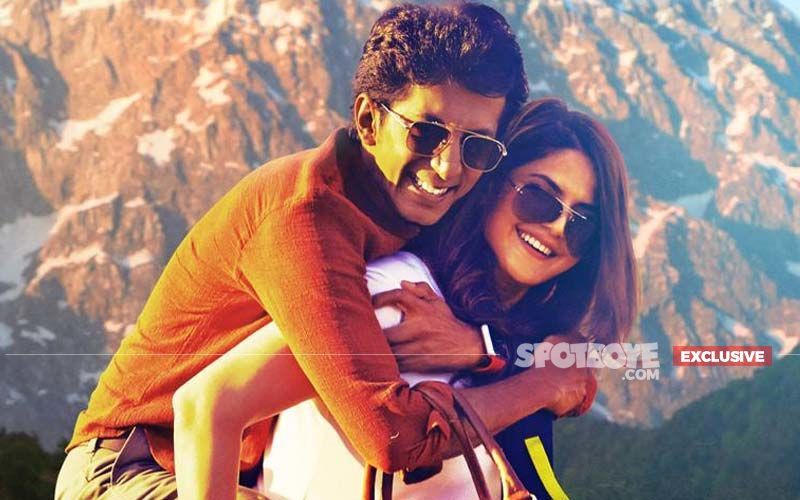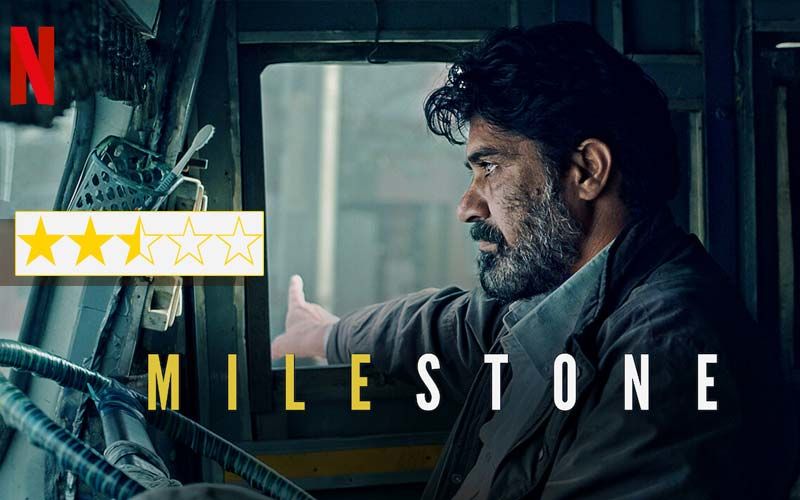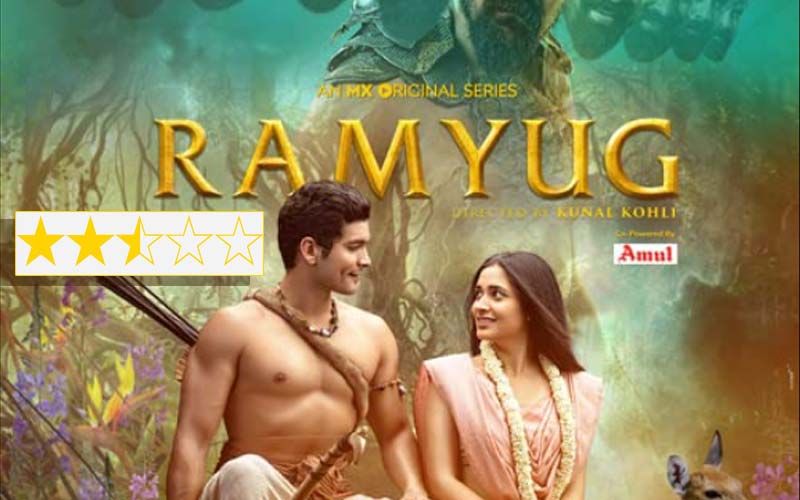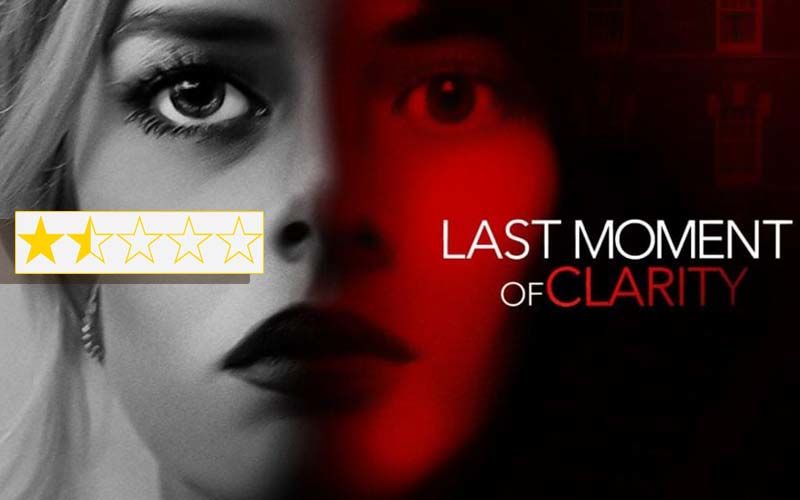Hum Bhi Akele Tum Bhi Akele Actor-Producer Anshuman Jha On Co-star Zareen Khan: ‘It Was Like Rahul Dravid And Shahid Afridi Batting Together’-EXCLUSIVE VIDEO
Anshuman Jha, whose next film, Hum Bhi Akele Tum Bhi Akele, also featuring Zareen Khan, opens today, talks about the film, representation of LGBTQ community in Hindi films, finding creative freedom as a producer and more in an exclusive conversation with SpotboyE.com

In his career of just over a decade, Anshuman Jha has proven his versatility, not just as an actor but as a producer as well, by being a part of stories that have made a difference in the world. And, he is all set to bring yet another heart-moving story with Hum Bhi Akele Tum Bhi Akele, featuring him and Zareen Khan, which releases today on Disney+ Hotstar. The film, that he is also producing, follows the discovery of an unlikely friendship between a gay guy and a lesbian girl, who embark on a road trip. In an exclusive conversation with Spotboye.com, Anshuman gets candid about the film, representation of LGBTQ community in Hindi films, finding creative freedom as a producer and more. Read excerpts from the interview:
Tell us something about Hum Bhi Akele Tum Bhi Akele that you think the audience should know about before they go see it.
It is a film that talks about acceptance, compassion and how we need to realise that we are all the same. We have a short span of time on this planet and we shouldn’t waste it bickering and putting things in bracket. We are nobody to decide what is right and wrong. We can only be accepting and the film kind of promotes that by a sweet, loving story about a beautiful friendship between two human beings. These two people could have been two guys or two girls as well. Here they are a guy and a girl, who both happen to be homosexuals. We are just saying that instead of looking it in a different way; treat it like a normal film, which exactly what it is. We need to start accepting stories at a human level instead of a divisive way.
The film has done rounds of film festivals across the world before reaching India. How has the reception been worldwide for the film?
I am very grateful for the reception that the film got internationally. We were very rushed when we premiered it in New York but we had a full house and nearly 40 per cent of the audience were from the LGBTQ community. New York being the LGBTQ capital of the world, I knew that if the film works there, we would have done something right. Fortunately, 98 per cent of the community loved it whereas I was expecting a 60-80 per cent thumbs up ratio. That was very satisfying.
The experience of the IFFM festival in Melbourne was great. We were the centrepiece film there. We couldn’t go there due to the pandemic but the response was phenomenal. Kashish is the biggest LGBTQ film festival of Asia, so it was satisfying showing the film there. We are not claiming to have made the perfect film, but the intent has been pure. The characters are flawed like every human being but the film celebrates the community and friendship, and thankfully everyone saw that.
Recently, Onir, who has been a voice from the community, tweeted that he loved the film’s trailer. So, I am very grateful and this film is for everybody. We showed it in Rajasthan and there 40 per cent of the audience was from Jaipur, so that’s how I gauged the Indian audience’s reaction. We tried to keep all the elements, there’s music and fun. We have just tried to tell an emotional story about finding love and friendship and the audience has been kind to that.
The film has faced several delays in release in India. You have been trying to get a date since 2019. So, what was that waiting period like, considering you are not just an actor but also a producer in the film?
I have faced so much in the last 12 months as a human being that I am now ready to face anything. I lost both my parents in the last 12 months and had to face the delay in the release of this film. It has taught me that good things happen in their own time. Honestly, I was very confident about the product we had made and the response at festivals had been so phenomenal that I knew that if I kept faith, we will get a deserving platform.
The real reason for the delay was that we did not get a censor for the film. We were going to release it in February 2020 but India cut wasn’t ready till then, so we pushed it to June since it is the LGBTQ month. The censor said on March 1 that they will give it an A certificate, even though it is a perfectly clean film. So, we re-applied and then the pandemic struck and the offices shut down. We then had to wait till the CBFC opened again, which was only in November 2020 and we got our certificate in December. We were hoping for theatres to open up but we were all struggling with the scenario, so we decided to release it on Disney+ Hotstar and I feel that it is the best platform for it because of the mood of the film.
After trying so hard for a theatrical release, does this OTT premiere come with a tiny amount of regret?
Life is about evolving with the times, and those who don’t evolve, they get stuck. I love theatres and the experience of communal viewing, but I also realise the reality of now and know that as human being I need to be flexible. The film is about acceptance, so we have to accept the challenge of the times too. I am just happy that the film will find an audience instead of waiting for six more months for the theatres to open. We are blessed to have the digital medium. Imagine this same scenario 10 years ago, when we wouldn’t even have had such an option. OTT release is a luxury we have and I am not saying it for the sake of it. I really mean that.
How was Zareen as a co-star?
Zareen is so full of energy and fun. She is very ambitious in the kind of work she wants to do and that is a very good thing. Since she has done films like Housefull 2 and Veer, we like to bracket people as per our perception, but she took this film up as a challenge. Now, hopefully, more doors will open for her for high content-driven cinema.
It was great for me to see an actor take up a challenge and doing justice to it. Zareen is a very different actor from me. I prepare a lot and then let instinct take over whereas she is very intuitive. It’s like Rahul Dravid and Shahid Afridi batting together. There was always an interesting jugalbandi. In real life, she is very fun-loving and tomboyish, and Mansi’s character is like that only, so it worked for us.
Hindi films have historically shown chemistry to be between a guy and a girl in love. With time, things have changed and films like Shubh Mangal Zyada Saavdhan and Ek Ladki Ko Dekha To Aisa Laga have tried to show love stories between two guys and two girls respectively. But in Hum Bhi Akele Tum Bhi Akele, you both portray homosexuals and you needed to have a platonic friendship, which still had a spark. So, how challenging was it to develop that chemistry?
Yes, it was a challenge to show that chemistry but I think the credit has to go to the writers and director. I was involved in the writing process of the film and Harish Vyas sir and I kept getting a lot of people from the community for the feedback so that we can make sure we were sensitive and not doing something which is unnatural. We needed first-hand advice as neither me nor Harish sir are homosexuals, so we had to be responsible. That is why it took almost a year and I think a film needs that kind of time for development.
Bollywood has historically caricaturised homosexuality or made it very dark, intense and broody. Basically, it’s either end of the spectrum. The film that really comes to my mind that dealt with the subject in a mature way was Shakun Batra’s Kapoor & Sons. It had a very humane take about homosexuality, where you cannot look at the character and say that they are gay. I have friends like that in real life. Me and Harish sir wanted to make sure that we stay away from pre-set templates as every human is the same. Till the time we will say them and us, we are creating discrimination. We are all ‘us’ and we wanted to make a film for ‘us’.
Talking about the LGBTQ representation in India, our films have kind of struggled with it with a lot of back and forth. How important do you think it is to take a step in the direction of showing them as human first and not define them by their sexual orientation?
I think that is the responsibility of any evolved and mature artist. We were in Singapore and Mark Bashit, who has been an Oscar winner, loved the film and he said that he was surprised that nobody had ever thought of looking at friendship from this point of view. We have had films about the friendship between two guys or two girls, but there has been no film that discovers friendship between a gay man and a lesbian woman, not just in India but anywhere. That in itself, Mark found an interesting take-off point. We are grateful to have got this chance and we have tried to do something new. Our intent was to make a humane story and it has been a challenge.
The current social and political environment in the country is very sensitive. Do you have any apprehensions about how would the audience take up a subject like homosexuality in today’s environment in the country?
I love India and everything about our country. We are blessed to be born here. I am in the middle of reading the Vedas as I always wanted to do it. I finished the Bhagavad Gita in the lockdown and it’s very interesting that historically our culture has been very welcoming, open and accepting. The root of our culture is that and that is why we have democracy, secularism and freedom of speech in our constitution. I am not that active on social media and I believe that I have made a good, clean film and I hope people see it from that perception. If someone has a bone to pick with me after this film, I am sorry in advance but I believe our audience has evolved over the years and I trust them. When you look at my films, LSD dealt with honour killing, Chauranga was about the caste system while Ye Hai Bakrapur was about a goat named Shah Rukh. There will always be some amount of backlash but that shouldn’t stop us as artists to speak the truth. And I have trust and faith in my audience.
In Hindi films, actors have kind of shied away from playing a gay character on screen and the reason is mostly given that the Indian audience can’t accept them as a heterosexual leading man after they have done such a role. Did you fear that perception from the industry too?
I really don’t know what the industry perceives me as. I quietly stay in my home and don’t indulge in these things much. I just want people to remember my characters, not Anshuman, because Anshuman will die someday but my characters will live on.
Last year in November, I was flying to the USA. At the customs, when I pulled down my mask, the customs officer just jumped up shouting, “Rajaram bhaiya”. Then the whole custom counter came and started calling me Rajaram, telling me how they loved my love story in the show. I feel happy when that happens.
My job is to act and live the character and if I can do that convincingly, I don’t worry about who thinks what. When I get the offer to play a gay character, I was excited as being a heterosexual man, I took it as a challenge to explore a side of me that in reality was unexplored. That is what actors should do, get out of their comfort zone and make the hard choices. Good actors do that. I hope the industry welcomes this character and doesn’t bracket me, and if they do, I hope they make a lot of LGBTQ films and cast me in them. (Laughs)
As an actor, you have to choose from the films that you are offered, but as a producer, you get to choose the stories you want to tell. Has that kind of liberated you?
It has majorly liberated me. They say beggars can’t be choosers but I am a beggar who chooses. I think production has given me that liberty where I can pick scripts, I believe in. When I did Mona Darling, I wanted to do a social media story. And it was written before The Social Network came out internationally. It was a 2012 script while that film came in 2015. The idea is to show high concept ideas that excite me but through a humane story. Hum Bhi Akele Tum Bhi Akele’s story was told to me in a cab ride in New York by Harish sir. He said if I’ll play the character, he’ll develop it and I instantly said yes as I loved it. So, yeah production has given me a lot of freedom but also a lot of headaches. (Laughs)
Image Source: Instagram/theanshumanjha, IMDb




